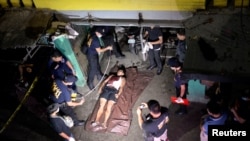In less than two months, nearly 2,000 people have been killed in Philippine President Rodrigo Duterte’s war on drugs and corruption. Rights groups oppose the extrajudicial killings and there’s even been a government inquiry into suspected abuse. VOA’s Asia Weekly spoke to those living in the Philippines to get their opinion on the program.
Juan Carlos Bautista is the CEO of a firm based in city of Muntinlupa. From his perspective, things have improved since Duterte’s crackdown, with more businessmen investing in the country. He feels authorities are following the rule of law, and people who complain that the program violates human rights do not recognize the scope of the Philppines drug problem.
“First of all you to realize that number one, we’re already in a bad situation as is,” he says, “Drugs are rampant. Ever since the President has stepped in, over 600,000 [people have surrendered].” Bautista said if that number doesn’t indicate that there’s a problem, then he doesn’t know what will.
“It [was] their choice on what you are doing illegally and [you have to] face the consequences. Isn’t that what laws are all about, I mean we have certain laws and if we don’t follow them – you get punished,” said Bautista.
However, not everyone in the Philippines shares Bautista’s view. Zena Bernardo works for an NGO in the Philippines that assists single parents who have been affected by violence.
She acknowledges there is a drug problem and that it should be controlled if it can’t be stopped completely, but feels the current atmosphere surrounding the killings is like “watching [a] “Mad Max” movie.” Bernardo says some in the Philippines are calling for “blood,” something she finds scary and disgusting.
Many of her friends supported Duterte’s programs, and where Bernardo comes from the majority of her relatives are happy with the killings. “They are killing drug pushers, they’re killing drug addicts; however, when one of my relatives was killed, a small time drug pusher, there was a rush of emotion among my relatives because suddenly it’s very personal.”
Carlos Kahn, a banking and finance manager based in Cebu, says the program has polarized the country. He says the Philippines should look abroad and “learn from [what] other countries have gone through… and those other countries have proven that wars on drugs do not really help.”
Kahn points to Portugal, a country that decriminalized drugs and treated it as a health problem rather than a crime problem. “They were able to reduce their drug problems significantly. Our present government seems to think that killing [drug dealers] is the solution.”
What will the future hold?
Speaking to reporters on August 21, Duterte took issue with the United Nations calling on him to stop the extrajudicial executions and killings. He says he will not only uphold human rights in his fight against drugs, but also ordered investigations into alleged abuses. Duterte called the U.N. irresponsible for relying on unnamed sources without conducting adequate investigations.
Senator Leila de Lima, whom the Department of Justice is investigating, held a two-day congressional inquiry into the killings, questioning officials in an attempt to understand the "unprecedented" rise in killings. Lima says she is “disturbed that we have killings left and right as breakfast every morning.”
So where does the Philippines go from here? Zena Bernardo calls President Duterte’s program a band-aid. “You just killing unimportant people (her term),” she says. Bernardo, like other critics, say the program focuses on eradicating low-level individuals, but not on those control the drug cartels. She asks for “an honest forgiveness drug campaign and if you’re not going to do that at least respect human rights.”
Juan Carlos Bautista says that while The Philippines is a nation of laws, too many times laws and programs aren’t implemented. “Now is the time for the Filipino people to rally behind the President and give him the support that he needs to rid of this menace,” said Bautista, calling Duterte’s plan the last chance the nation has to get rid of the drug problem.
Ultimately, whatever happens, Carlos Kahn says Filipinos should remember that the country is signatory to a number of international agreements and that they’re binding. So the government should continue to go after criminals of all types. However, if the current push to eliminate those affiliated with the drug trade is tied only to Duterte’s campaign promises, he says that’s “a poor excuse for killing people.”







